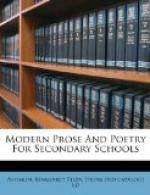Our initiation into American ways began with the first step on the new soil. My father found occasion to instruct or correct us even on the way from the pier to Wall Street, which journey we made crowded together in a rickety cab. He told us not to lean out of the windows, not to point, and explained the word “greenhorn.” We did not want to be “greenhorns,” and gave the strictest attention to my father’s instructions. I do not know when my parents found opportunity to review together the history of Polotzk in the three years past, for we children had no patience with the subject; my mother’s narrative was constantly interrupted by irrelevant questions, interjections, and explanations.
The first meal was an object lesson of much variety. My father produced several kinds of food, ready to eat, without any cooking, from little tin cans that had printing all over them. He attempted to introduce us to a queer, slippery kind of fruit, which he called “banana,” but had to give it up for the time being. After the meal, he had better luck with a curious piece of furniture on runners, which he called “rocking-chair.” There were five of us newcomers, and we found five different ways of getting into the American machine of perpetual motion, and as many ways of getting out of it. One born and bred to the use of a rocking-chair cannot imagine how ludicrous people can make themselves when attempting to use it for the first time. We laughed immoderately over our various experiments with the novelty, which was a wholesome way of letting off steam after the unusual excitement of the day.
In our flat we did not think of such a thing as storing the coal in the bathtub. There was no bathtub. So in the evening of the first day my father conducted us to the public baths. As we moved along in a little procession, I was delighted with the illumination of the streets. So many lamps, and they burned until morning, my father said, and so people did not need to carry lanterns. In America, then, everything was free, as we had heard in Russia. Light was free; the streets were as bright as a synagogue on a holy day. Music was free; we had been serenaded, to our gaping delight, by a brass band of many pieces, soon after our installation on Union Place.
Education was free. That subject my father had written about repeatedly, as comprising his chief hope for us children, the essence of American opportunity, the treasure that no thief could touch, not even misfortune or poverty. It was the one thing that he was able to promise us when he sent for us; surer, safer than bread or shelter. On our second day I was thrilled with the realization of what this freedom of education meant. A little girl from across the alley came and offered to conduct us to school. My father was out, but we five between us had a few words of English by this time. We knew the word school. We understood. This child, who had never seen us till yesterday, who could not pronounce our names, who was not much better dressed than we, was able to offer us the freedom of the schools of Boston! No application made, no questions asked, no examinations, rulings, exclusions; no machinations, no fees. The doors stood open for every one of us. The smallest child could show us the way.




